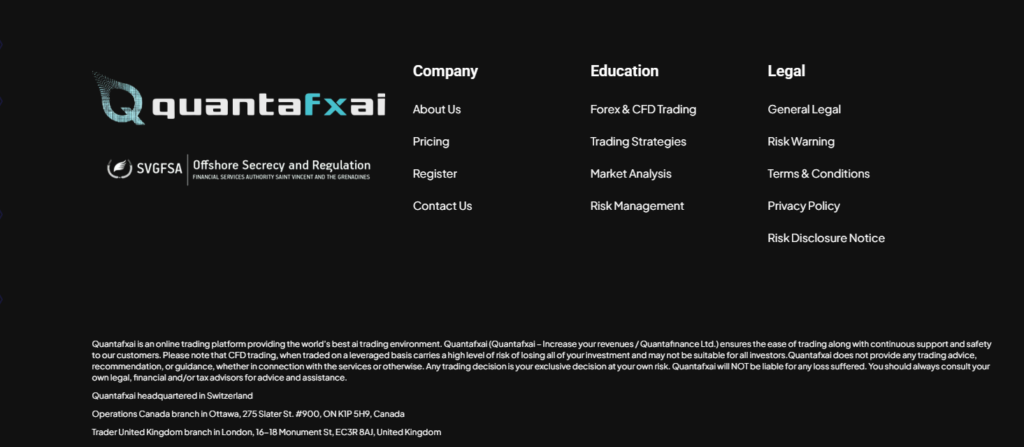Financial technologies are advancing rapidly, but buzzwords like “artificial intelligence” and “algorithmic trading” often hide old scams. Quantafx AI positions itself as an innovator using AI to “revolutionize trading.” However, behind its bold claims lie risks every investor should recognize.
Dubious Registration: Where Is Quantafx AI Based?
The first red flag is the company’s legal address. Quantafx AI is registered in Mauritius—an island nation that has long been a tax haven for shady ventures. Local regulators don’t require fintech companies to obtain licenses for international operations, and oversight is purely superficial.
For investors, this means: if disputes arise or withdrawals stall, you’ll have no protection. Even if Quantafx AI vanishes with your money, filing a lawsuit will be nearly impossible due to complex international jurisdiction.

AI or Illusion? How Quantafx AI Misleads Investors
The company heavily promotes “groundbreaking algorithms” that supposedly generate up to 200% annual returns. Yet details about their operations remain murky:
- No verified results: Quantafx AI doesn’t publish audited reports or real trading statistics.
- Vague explanations: Managers respond to strategy questions with generic phrases like “neural networks analyze markets 24/7.”
- Ignoring risks: Ads never mention potential losses, even though even advanced algorithms fail—as seen during the 2022 crypto crash.
Experts warn: no AI guarantees profits in unpredictable markets.
Client Reviews: The Two Faces of Quantafx AI
The official website boasts hundreds of glowing testimonials. But on independent platforms like Reddit and Trustpilot, the story changes:
- Delayed payouts: Users report withdrawal requests taking weeks, with support ignoring inquiries.
- “Technical glitches”: Profitable trades often “freeze,” only to close at a loss.
- Hidden fees: Contracts bury daily charges for “AI model maintenance”—up to 2% of deposits—in fine print.
These patterns suggest Quantafx AI prioritizes its profits over clients’ interests.

How Quantafx AI Drains Your Funds: The Playbook
An analysis of the company reveals a familiar scam blueprint:
- Building credibility through tech jargon: Flashy videos with neural network animations, blockchain references, and buzzwords like “Big Data.”
- Trapping newcomers: Free webinars promise “effortless income,” followed by pressure to invest at least $500.
- Faking activity: Client funds aren’t traded on real markets—instead, the company displays fake charts and “successful trades.”
- Phantom support: After complaints pile up, support shifts focus to new victims, telling old clients to “wait for algorithm optimizations.”
5 Reasons to Avoid Quantafx AI
- No regulation: The company lacks licenses from FCA, CySEC, ASIC, or other reputable authorities.
- Zero transparency: No data on its team, audits, or company history.
- Platform manipulation: Quotes may be delayed, and stop-loss orders ignored.
- Deposit pressure: Managers push clients to “upgrade” service packages for “maximum AI efficiency.”
- Fake innovation: Using “AI” is a marketing gimmick, not a technological edge.
How to Protect Yourself: An Investor’s Guide
If you’ve already invested with Quantafx AI:
- Demand an immediate withdrawal, even if they promise “imminent profit growth.”
- Save all documents: receipts, trade screenshots, and correspondence.
- File a complaint with your local regulator (e.g., SEC or FCA).
When choosing a trading platform:
- Verify licenses on regulators’ websites—legitimate companies always display them.
- Avoid projects that hide their jurisdiction or team details.
- Test strategies on a demo account for at least 3 months.
- Research reviews on independent sites, not just the company’s platform.
Quantafx AI is a “high-tech” facade for an age-old scam. Lack of transparency, platform manipulation, and offshore secrecy make it a dangerous choice. Remember: the real AI in trading is your critical thinking and ability to spot innovation versus illusion. Don’t let scammers turn your investments into an expensive lesson. Stay skeptical, stay informed.








